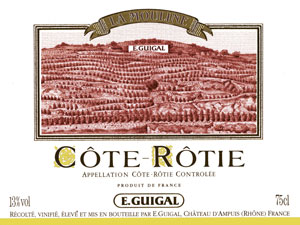| Region | |
|---|---|
| Subregion | France > Rhône > Northern Rhône > Côte Rotie |
| Colour | Red |
| Type | Still |

Bottled earlier this year, the 2010 Cote Rotie la Mouline is an incredible effort that gives up classic creme de cassis, spring flowers, licorice, coffee bean and spiced meat-like aromas and flavors to go with a full-bodied, sexy, seamless and blockbuster-styled profile on the palate. While more reserved and focused than the 2009, it nevertheless has incredible amounts of fruit and texture, thrilling purity and a finish that just won't quit. It will certainly rival the 2009, 2005, 2003 and 1999, and when all is said and done, the 1978. It will have 4 to 5 decades of longevity. Drink 2020-2040.
One of the reference point estates for top quality wines in the world today, the family-run Guigal operation was created in 1946 by Etienne Guigal. Today, Etienne's son, Marcel, and his son, Philippe, are firmly in control here, and are without a doubt producing some of the most singular, sought-after wines in the world. Due to the size of this tasting, I'll keep my comments short, but the incredible quality coming from this operation is astounding, and a tasting here is always one of the highlights of any trip through the region. Furthermore, while a lot is said about the extended oak aging regime here, I don't know anyone who tastes mature examples of these wines on a regular basis that still has any doubts about the genius going on here. In short, these single-vineyard (and their blends as well) Cote Roties are some of the greatest wines money can buy. For this tasting (which, with the Guigals, is always a large one!), we focused on their Saint Joseph Vignes des Hospice release, and then three of their Cote Roties, starting with the classic Brune et Blonde, then the Chateau d'Ampuis, and finishing with their single-vineyard La Mouline. Stepping up over the Brune et Blonde, the Cote Rotie Chateau d'Ampuis is named after the Chateau d'Ampuis estate (which lies in the town of Ampuis, along the Rhone River, and was purchased by the Guigal's in 1995). It is a blend of their top estate vineyards. Coming from La Garde, Le Clos, Grande-Plantee, Pommiere, Pavillon, Le Moulin and La Viria, it spends close to four years in new French oak (handled just like the single-vineyard releases) and there are roughly 30,000 bottles produced in each vintage. While the single-vineyard releases get all the buzz, this is isn't far behind in quality, especially in recent vintages, and can represent an incredible value. We finished the tasting with a vertical of La Mouline. One of the three single-vineyard Cote Roties produced, this cuvee comes all from the La Mouline lieu-dit that's located in the more western (close to the middle actually) side of appellation. For simplicity's sake, you could say it's in the Cote Blonde part of the region, but in reality, Cote Rotie is much more complex and diverse. Due to its exposure, this vineyard is always the first of the three single-vineyards to be harvest, and also contains some of the oldest vines on the estate. Fermented using pump-overs (as opposed to punch-downs for the La Torque and submersion cap on the La Landonne), it's cofermented with varying degrees of Viognier, which, in most vintages, ends up being about 10% of the blend. Like the Chateau d'Ampuis and the other two single-vineyard releases, it sees close to four years in 100% new French oak, of which every trace integrates after a few years in bottle. It's always the most approachable of the single-vineyard releases, and is ready to drink at an earlier stage. For example, the 1999 La Mouline is gloriously mature, while the 1989 La Torque is still an infant. Nevertheless, as the 1978 reviewed here attests to, it has no problem evolving for decades (although I don't recommend holding bottles that long). In short, this was a flight of Cote Roties I'll not forget anytime soon!
Scheduled to be bottled in early February of next year (the La Mouline is the first of the single vineyard releases to be bottled), the 2010 Cote Rotie La Mouline is certainly in the same league. More fresh and focused, with heavenly black raspberry, wild flower, underbrush, crushed rock-like minerality and hints of vanilla, it flows onto the palate with a seamless, pure silk texture that carries awesome concentration, ultra-fine tannin and incredible length. It will need more cellar time than the 2009, and have 2-3 decades of prime drinking.